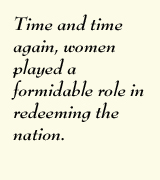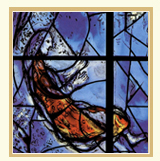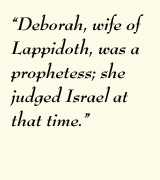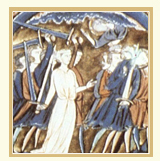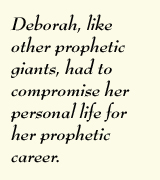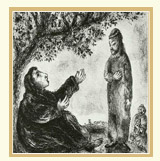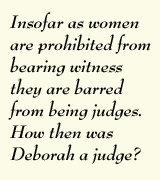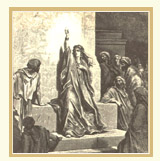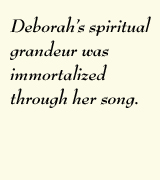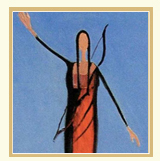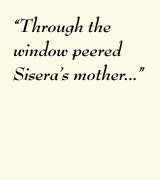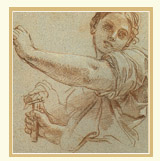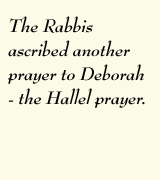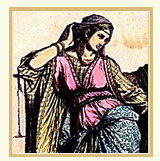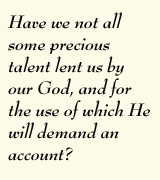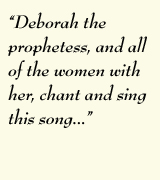Deborah
Introduction
In the ancient world, the joy of victory gave rise to triumphal songs. These songs detailed the account of battles waged and won, and vividly described the bravery of the military leaders and their troops. In the Bible such songs focus on salvation brought about by the Almighty, and contain glorious praise for God’s miraculous redemption. It is noteworthy that women play a central role in these victory songs.
At the parting of the Red Sea, Miriam the prophetess led all of the women in song.
Then Miriam the prophetess, Aaron’s sister, took a timbrel in her hand, and all the women went out after her in dance and with timbrels. And Miriam chanted for them.
(Exod. 15:20-21)
After David defeated Goliath we are told:
When the troops came home and David returned from killing the Philistine, the women of all the towns of Israel came out singing and dancing to greet King Saul with timbrels, shouting and sistrums. The women sang as they danced and chanted: Saul has slain his thousands, David his tens of thousands!”
(I Sam 17: 6)
In like measure, Deborah’s victory song immortalized the defeat of Sisera, the general of Jabin the King of Canaan, and gave thanks to the God of Israel.
Women were such an integral part of the experience of this type of shira,(the feminine noun for song) that one midrashic tradition actually depicts women as the symbol of suppression and deliverance.
Az yashir Moshe uvenei Yisrael et hashira hazot Then Moses and the Israelites sang this song to the Lord!…R. Berachya and R. Joshua the son of Levi [asked] why are the Jewish people likened unto a female? Because a female loads and unloads (becomes pregnant and gives birth), loads and unloads until she finally loads no more. So too Israel is enslaved and redeemed, enslaved and redeemed until they are never enslaved again. In this world since their troubles are those of a birthing woman (continually enslaved and delivered) they sing a song (shira) before Him in the feminine.
The premise of this midrash in Song of Songs Rabbah (1:36) is that the people of Israel are enslaved and redeemed time after time, like a woman carrying a child and giving birth. This notion is further developed in a commentary to Midrash Rabbah known as Etz Yosef. This commentary was written in the 19th century by R. Hanoch Zundel of Bialystok.
The trials and tribulations (of Israel) can be likened unto a child-bearing woman insofar as after delivering she is again be-labored. Therefore, these (biblical) songs were expressed in the feminine to intimate that more trials would follow suit.
Note that all the redemptions were brought about by women. Even though Moses engineered the redemption from Egypt, it was Bitya, Pharoah’s daughter who rescued him from the water and raised him, hence she was credited with the redemption. So too, the salvation of the Jewish people from Sisera was through the agency of Deborah and Jael the wife of Heber the Kenite. Similarly, the redemption from Antiochus was through Judith, and that of Purim was through Esther.[1]Etz Yosef points out that the midrash concludes with the assertion that in the future the redemption will be through the shir in the masculine. Like a man Israel will then be unencumbered and the redemption will be everlasting.
R Hanoch Zundel transposed the midrashic metaphor of the pregnant and birthing woman into historic time highlighting a recurrent phenomenon in the history of Israel. Time and time again, women played a formidable role in redeeming the nation. The five noble women he mentions are Pharaoh’s daughter – Bitya, Deborah, Jael, Judith and Esther. It was their courage that was responsible for Israel’s salvation.
Deborah the Prophetess
Two of the women mentioned above, Deborah and Jael lived in the period of the Judges. Let us consider their contribution to salvation history.
Deborah, wife of Lappidoth, was a prophetess; she judged Israel at that time. She used to sit under the Palm of Deborah, between Ramah and Bethel in the hill country of Ephraim, and the Israelites would come to her for judgments.
(Judges 4:4-5)
Little is known about Deborah. Our initial introduction to her is to Deborah Eshet Lapidoth. One possible translation of the phrase is Deborah the wife of Lappidoth. The name Lappidoth (Hebrew for torches) may also be another name for Barak (Hebrew for lightening), who is assumed by many commentators to be Deborah’s husband. Alternatively, the phrase Deborah, eshet Lapidot, could mean a woman of lappidoth – a woman of torches; a luminary. The medieval biblical commentator Rabbi Levi ben Gershom (Ralbag) explains the phrase as follows:
The woman of Lappidoth. The wife of Barak or similar to “a woman of valour” –eshet chayil, that is to say that her stature in prophecy was such that around her torches [luminescence] appeared similar to Moses our teacher of blessed memory.
(Ralbag, Judges 4:4)
Others suggest that eshet lappidot denotes Deborah as a counterpart of Barak. Deborah’s status as a luminary is further elucidated as the Bible informs us that she was a female prophetess — isha nevia. The Rabbis list her as one of the seven prophetesses of Israel. The following women were given this status; Sarah, Miriam, Deborah, Hannah, Abigail, Hulda and Esther. [2]Megilla 14a, Yael Levin Katz, “Sheva Neviot vesheva Sefirot”, Daat (2000), pp. 123-130. Three of them; Miriam, Deborah and Hulda are actually called prophetesses in Scripture itself. Miriam is portrayed as a prophetess in Exodus chapter 15 and in Numbers chapter 12. Hulda is presented as the court prophetess, consulted by King Hezekiah in IIKings chapter 22.
Unlike her prophetic colleagues Miriam and Hulda, the prophecy of Deborah is somewhat amorphous. In his commentary to Judges 4:6, R. David Kimhi claims that her prophetic messages must have only been of relevance to contemporary audiences, rather than predicting future events. That would explain their noticeable absence from the biblical text.
However, prophecy is a matter of vision, and all seven prophetesses listed in the Talmud were women of vision. They each rose above their personal circumstance and raised others along with them. It is this display of leadership that places them in the prophetic hall of fame. Deborah was a towering and unique example of such leadership. She was a prophetess, a judge, and the military commander, who summoned Barak, the chief of staff of the Israelite army to mobilize his troops and bring about victory.
The Rabbis had difficulty with the all three dimensions of Deborah’s status, but concluded that her virtue placed her in a category all by herself and validated her worthiness:
The Gemara adds another potential land mine encountered in public leadership roles — arrogance.
…there were two haughty women, whose names were identical to the names of loathsome creatures. One, Deborah, was called a hornet, as her Hebrew name, Devorah, means hornet; and one, Huldah, was called a marten, as her name is the Hebrew term for that creature. From where is it known that they were haughty? With regard to Deborah, the hornet, it is written: “And she sent and called Barak” (Judges 4:6), but she herself did not go to him. And with regard to Huldah, the marten, it is written: “Say to the man that sent you to me” (II Kings 22:15), but she did not say: Say to the king.
Megilla 14b
And Deborah a woman prophetess. What is the nature of Deborah’s prophecy? She prophesied about Israel and judged them. But wasn’t Phineas the son of Elazar around? I call the heavens and the earth as my witnesses everything is according to the actions of the individual that in receiving the Shechinah (divine spirit). [3]Seder Eliahu Rabbah 10:1
Deborah’s closeness to the divine is accentuated in sources that portray miracles brought about under her aegis:
Just as the Holy One Blessed be He brought about miracles through the tribes of Judah and Benjamin on the Red Sea so He brought about miracles through the chieftans of Zebulun and Naftali under the leadership of Deborah.
(Zohar, Beshalach 5)
Barak and Deborah
Kohelet Rabbah reinforces Deborah’s involvement in miracles while highlighting her partnership with Barak.
Deborah and Barak turned night into day as it says, “And Deborah and Barak the son of Avinoam sang on that day. Rabbi Pinchas and Rabbi Hilkiah in the name of Rabbi Simon said, Six miracles took place on that day, on that very day they arrived, on that day she (Deborah) sent for him and sent him on his way, on that day they waged war, on that day Sisera was killed, on that day they divided the spoils and on that day they sang the song.
(Kohelet Rabbah 3:17)
This midrash points out their togetherness in performing miracles which reflects their togetherness in the biblical text itself.
She summoned Barak son of Abinoam, of Kedesh Naphtali, and said to him, “The Lord, the God of Israel, has commanded: Go, march up to Mount Tabor, and take with you ten thousand men of Naphtali and Zebulun. And I will draw Sisera, Jabin’s army commander, with his chariots and his troops, toward you up to the Wadi Kishon; and I will deliver him into your hands.” But Barak said to her, “If you will go with me, I will go; if not, I will not go.” Very well, I will go with you,” she answered. “However, there will be no glory for you in the course you are taking, for then the Lord will deliver Sisera into the hands of a woman,.” So Deborah went with Barak to Kedesh. Barak then mustered Zebulun and Naphtali at Kedesh;; ten thousand men marched up after him, and Deborah also went up with him.
(Judges 4:6-10)
Rabbinic literature debates as to whether or not Barak was Deborah’s husband. The dominant opinion is that he was. This gives rise to the obvious question, why they weren’t together at this juncture? Radak (Judges 4:6) answers that she had separated from him in order to receive prophecy. Deborah, like other prophetic giants had to compromise her personal life for her prophetic career.
Deborah the Judge
Although Deborah’s role in enacting miracles is not explicitly delineated in the Bible, her role as a judge is:
Deborah, wife of Lappidoth, was a prophetess; she judged Israel at that time. She used to sit under the Palm of Deborah, between Ramah and Bethel in the hill country of Ephraim, and the Israelites would come to her for judgments.
(Judges 4:4-5)
Only two biblical characters are distinguished as having been both judges and prophets – Samuel and Deborah. While this distinction is noteworthy vis a vis Samuel, regarding Deborah it is revolutionary.
Talmudic law asserts that anyone worthy of bearing testimony is worthy of judging [4]Niddah 50a and vice versa. Insofar as women are prohibited from bearing witness they are barred from being judges. [5]David Gutmann, “Female Ego Styles and Generational Conflict, in Matina Horner, Feminine Personality and Conflict, (Calif., 1970) pp. 77-96. How then was Deborah a judge? The commentary of the Tosafists ad loc suggests two answers.
The first connects her judgment to her prophecy. In this opinion, Deborah is described as issuing her verdicts from on high. It wasn’t that she was actually a judge. She was a prophetess receiving divine directives. The second opinion was that she didn’t really judge she just taught laws. These and other exegetical attempts try to neutralize the prohibition of a woman serving as a judge.
One halachic authority, the Rashba finds an legal way around the problem. He claims that Deborah’s status was similar to a witness who is disqualified because she is related to the person on trial. Her testimony may be legitimate if accepted by all sides through popular consensus. Such was the case with Deborah.[6]The halachic point of departure surrounding this debate is the verse in Deuteronomy18:18:שום תשים עליך מלך מלך ולא .מלכה Rambam in Hilchot Milachim 1:5 expands the prohibition
אין מעמידים אשה במלכות אינמר עליך מלך ולא מלכה וכן כל משימות שבישראל אין ממנים בהן אלא איש.
Although the source of this Rambam is enshrouded in mystery the idea is clear שררה positions of power are off limits for women. The Gemara then establishes the principal that one who is disqualified from judging is barred from testifying כל הכשר לדון כשר להעיד and conversely, one who is not fit to testify is unfit to judge. (Niddah 49b)
And so Deborah was accepted by the people as a prophetess, and a judge. Targum Jonathan translates Deborah’s scriptural debut in Judges 4:1 in a most unusual fashion.
“And she was dwelling in her city Atatrot supporting herself from what was hers. She had palm trees in Jericho, gardens in Ramah, olive trees producing oil in the plains, troughs in Bethel, white dust in the hill country of the king and the children of Israel came to her for judgment.”
It is interesting to speculate as to why the Targum transformed Deborah into an independently wealthy woman. The Talmud in Nedarim 38a [Link torah temima] lists those qualities necessary to qualify as a prophet. A prophet must be strong, wealthy, wise and humble. We can well understand the need for a prophet to be wise or humble but why wealthy? One possible explanation is that there will be no motive for dishonesty. Additionally, it may afford her a social status thereby making him honored by others. The Targum may be an attempt to explain Deborah’s credibility in the eyes of the people.
Deborah’s Song
Whatever the motivating factors that compelled commentators to delimit Deborah’s status as a judge, they were not applied to her contribution to the world of prayer. Deborah’s spiritual grandeur was immortalized through her song.
Behold there were two women in the world who praised the Holy One Blessed be He in an extraordinary manner unlike all of the heroes of the world! Who were they? Deborah and Hannah.
(Zohar Leviticus 328/Genesis 362)
Deborah’s prayer is a victory song which opens as follows:
On that day Deborah and Barak son of Abinoam sang:
When locks go untrimmed in Israel,
When people dedicte themselves—Bless the Lord!
Hear O kings, Give ear, O potenates!
I will sing, will sing to the Lord,
Will hymn the Lord, the God of Israel.
O Lord when you came forth from Seir,
Advanced from the country of Edom,
The earth trembled;
The heavens dripped,
Yea the clouds dripped water,
The mountains quaked—
Before the Lord, Him of Sinai,
Before the Lord, God of Israel.
The song contains many archaic passages which are difficult for the modern reader to decipher. Michael Fishbane clearly outlines the sequence of ideas and the over all structure of the song. (Michael Fishbane, The JPS Bible Commentary: Haftarot, (Philadelphia, 2002) pp. 98-100.) The initial passage – the prologue announces the song of thanks. It is then followed by a description of God’s advance to battle described in mythic terms. The ballad then reviews the historical situation, praising God and the leadership of Deborah. Deborah then praises the tribes who fought nobly and won. The last section reports Jael’s heroic killing of Sisera and portrays the mother of Sisera awaiting her son’s triumphant return from battle. The epilogue includes Deborah’s denunciation of the enemies of God and hope for the dominion of the faithful.
In the days of Shamgar son of Anath,
In the days of Jael, caravans ceased,
And wayfarers went
By roundabout paths.
Deliverance ceased,
Ceased in Israel,
Till you arose, O Deborah,
Arose, O mother, in Israel!
When they chose new gods,
Was there a fighter then in the gates?
No shield or spear was seen
Among forty thousand in Israel!
My heart is with Israel’s leaders,
With the dedicated of the people –
Bless the Lord!
You riders on tawny she-asses,
You who sit on saddle rugs,
And you wayfarers, declare it!
Louder than the sound of archers,
There among the watering places
Let them chant the gracious acts of the Lord,
His gracious deliverance of Israel.
Then did the people of the Lord
March down to the gates!
Awake awake, strike up the chant!
Arise, O Barak;
Take your captives, O son of Abinoam!
Then was the remnant made victor over the mighty,
The Lord’s people won my victory over the warriors.
From Ephraim came they whose roots are in Amalek;
After you, your kin Benjamin;
From Machir came down leaders,
From Zebulun such as hold the marshal’s staff.
And Issachar’s chiefs were with Deborah;
As Barak, so was Issachar—
Rushing after him into the valley.
Among the clans of Reuben
Were great decisions of heart.
Why then did you stay among the sheepfolds
And listen as they pipe for the flocks?
Among the clans of Reuben
Were great decisions of hear
Why then did you stay among the sheepfolds
And listen as they pipe for the flocks?
Among the clans of Reuben
Were great searchings of heart!
Gilead tarried beyond the Jordan;
And Dan—why did he linger by the ships?
Asher remained at the seacoast
And tarried at his landings.
Zebulun is a people that mocked at death,
Naphtali—on the open heights.
Then the kings came, they fought:
The kings of Canaan fought
At Taanach, by Megiddo’s waters—
They got no spoil of silver.
The stars fought from heaven,
From their courses they fought against Sisera.
The torrent Kishon swept them away,
The raging torrent, the torrent Kishon.
March on, my soul, with courage!
Then the horses’ hoofs pounded
As headlong galloped the steeds.
Curse Meroz! Said the angel of the Lord.
“Bitterly curse its inhabitants,
Because they came not to the aid of the Lord,
To the aid of the Lord among the warriors.”
Most blessed of women be Jael,
Wife of Heber the Kenite,
Most blessed of women in tents.
He asked for water, she offered milk;
In a princely bowl she brought him surds.
Her [left] hand reached for the tent pin,
Her right for the workmen’s hammer.
She struck Sisera, crushed his head,
Smashed and pierced his temple.
At her feet he sank, lay outstretched,
At her feet he sank, lay still;
Where he sank, there he lay—destroyed.
Through the window peered Sisera’s mother,
Behind the lattice she whined;
Why is his chariot so long in coming?
Why so late the clatter of his wheels?”
The wisest of her ladies give answer;
She too replies to herself:
“They must be dividing the spoil they have found:
A damsel or two for each man,
Spoil of embroidered cloths,
A couple of embroidered cloths
Round every neck as spoil.”
So may all Your enemies perish, O Lord!
But may His friends be as the sun rising in might!
And the land was tranquil forty years.)
This ancient victory song is an example of prayer that was appropriate for the time and place when it was written. However, among the salient messages for a contemporary audience, the role of women in salvation history is central.
Jael and Sisera’s Mother
Deborah’s song makes mention of two additional women, The first is Jael the wife of Heber the Kenite:
Most blessed of women be Jael,
Wife of Heber the Kenite,
Most blessed of women in tents.
He asked for water, she offered milk;
In a princely bowl she brought him curds.
Her [left] hand reached for the tent pin,
Her right for the workmen’s hammer.
She struck Sisera, crushed his head,
Smashed and pierced his temple.
At her feet he sank, lay outstretched,
At her feet he sank, lay still;
Where he sank, there he lay – destroyed.
(Judges 5:24-27)
In the final stages of Deborah and Barak’s war against the Canaanites, Sisera, military commander of Jabin, King of Canaan (Link) fled on foot to Jael’s tent for hospitality and security. She offered him milk, to put him to sleep at which point she killed him. Jael, therefore brought about the prediction of Deborah to Barak: ” Very well I will go with you, however, there will be no glory for you in the course you are taking, for then the Lord will deliver Sisera into the hands of a woman.” (Jud. 4:9) The Rabbis laud the courage of Jael and assert that she was greater than the matriarchs.[7]Nazir 23b
The second woman described in Deborah’s song is the mother of Sisera (em Sisera):
Through the window peered Sisera’s mother,
Behind the lattice she whined;
“Why is his chariot so long in coming?
Why so late the clatter of his wheels?”
The wisest of her ladies give answer:
She, too, replies to herself:
“They must be dividing the spoil they have found:
A damsel or two for each man,
Spoil of dyed cloths for Sisera,
Spoil of embroidered cloths,
A couple of embroidered cloths
Round every neck as spoil.”
So may all of Your enemies perish, O Lord!
But may His friends be as the sun rising in might!
And the land was tranquil forty years.
(Jud. 5:28-31)
Em sisera — the mother of Sisera is not a character described in the prose section of the Deborah narrative. Yet her portrayl in the song of triumph, provides a foil to Deborah who is called em b’Yisrael (mother of Israel) [LINK: Yael Unterman, “The Voice of the Shofar”, in Torah of the Mothers, Ora Elper Susan Handelman, (Jerusalem, 2000) , and a heart rending demonstration of Deborah’s words, “So let all Thy enemies perish, O Lord” — (5:31) come what may.
The Talmud uses the cries of Sisera’s mother as the basis of the shofar blasts sounded on Rosh Hashannah:
It is written, “It shall be a day of blasting (yom teruah) unto you (Numb. 29:1) and we translate, a day of yebava (wailing); and it is written of the mother of Sisera, “Through the window she looked forth and she lamented (vateyabev.” One authority thought that this meant drawing a long sigh and another that it meant uttering short piercing cries.
(Rosh Hashannah 33b)
Based on this passage we derive many of the laws of shofar blowing.
In her article, “The Voice in the Shofar”,[8]Ora Elper and Susan Handelman, Torah of the Mothers, (Jerusalem, 2000), 170-193 Yael Unterman explains the association as follows.
Yet on another level, she is still at a point in time where she may reassure herself, imagining her son is still alive and is victoriously bringing home the booty. On this level, our past is her present and our present, withits knowledge of her tragedy, does not comprise her future for she lives in hope of a different end.
It seems to me that em Sisera’s condition of dialectical emotions and time-frames is a model for us as we hear the shofar on Rosh Hashanah: it evokes grief and loss, but also hope. The groan of the shofar arouses deep feelings of alienation and lack of sense of self: on the Day of Judgment we are stripped of our standing and of the delusions we hold dear the rest of the year, which comprise the core of our life. We grieve the loss of innocence and purity we brought upon ourselves by sinning. The sigh of the shofar echoes a sigh rising from the depths of our being, as our world seems to crumble around us.
(pp. 189-190)
Deborah’s Other Song
Deborah describes herself as singing : “Awake, Awake, O Deborah, Awake, awake strike up the chant”. Her song in the Book of Judges gives expression to her multi-faceted experience as well as that of the nation. It culminates with a return to God and a prayer for the downfall of all the enemies of Israel and the success of those loyal to the Lord. However. The Rabbis ascribed another prayer to Deborah – the Hallel. The Hallel prayer contains a collection of chapters from the Book of Psalms. Some of them are sheer praise of God’s glorious acts. Others describe the trials and tribulations we undergo that propel us to turn to the Master of the Universe for salvation.
Central to the Hallel prayer is Psalms chapter 15. The Psalm begins with the verse: “Not to us, O Lord, not to us
But to Your name bring glory for the sake of Your love and Your faithfulness.” (115:1) The Rabbis[9]Pesachim 117a use this verse to ascertain who composed Hallel? A long and impressive list of candidates are nominated, including Deborah and Barak.[10]Moses and Israel, upon crossing the sea, Joshua and Israel upon vanquishing the kings of Canaan, Hezikiah when threatened by Sennacarib, Hannaniah, Mishael and Azaria when being thrown into the fiery furnace by Nebuchadnezar, Mordechai and Esther when confronted by Haman. The Rabbis conclude that the prophets among them established Hallel to be said at every juncture for every trouble that befalls the Jewish people.
Focusing on Deborah’s song, it is clear that this eternal message is encapsulated within in. Despite Deborah’s important roles as a religious military and political leader, she understood well and gave expression to the fact that salvation is totally in the hands of God. That which we do is not for us but serves a higher purpose.
A Message for All Women
In her classic work, The Women of Israel, Grace Aguilar describes Deborah’s native abilities and her historic precedent. She set the tone for all women to be accepted as leaders, those women whose personal merit make them eminently above all others. Aguilar then describes the inspiration she provides for women of all times:
God Himself through His gifts, infers a noble confidence and respectful consideration towards her, evidently springing at once from the national equality and freedom tendered to Jewish women; and from a mind great enough to appreciate and value such talents even in a woman; a greatness not very often found in modern times.
To follow in the steps of our great ancestress is not possible now that the prophetic spirit is removed from Israel, and the few public offices left us fall naturally to the guardianship of man; yet many and many a Jewish woman is intrusted with one or more talents direct from God; and if she can stretch forth a helping hand to the less enlightened of her people, let her not hold back, from the false and unscriptural belief that woman cannot aid the cause of God, or in any way attain to religious knowledge. His word is open to her, as to man. In Moses’ command to read and explain the law to all people, woman was included by name. And now the whole Bible, Law, Historical books, Psalms and Prophets, are open to her daily commune, and shall it be said that she has neither the right nor the understanding to make use of such blessed privilege? Shame, shame on those who would thus cramp the power of the Lord, in denying to any one of His creatures the power of addressing and comprehending Him, through the inexhaustible treasure of His gracious word!
Every married woman is judge and guardian of her own household. She may have to encounter the prejudices of a husband, not yet thinking g with her on all points; but if she have really a great mind she will know how to influence without in any way interfering. She will know how to serve the Lord in her household without neglecting her duty and affection towards her husband; and by domestic conduct influence society at large, secretly and unsuspectedly indeed, but more powerfully than she herself can in the least degree suppose.
To unmarried women, even as to wives, some talent is intrusted, which may be used to the glory of its Giver. Life is not lent to us to be frittered away in an unmeaning little satisfactory run of amusements, or often in their mere fruitless search. There surely is some period in a single woman’s existence, when the hopes, ambition and even favorite amusements of girlhood must come to an end. Because unmarried is woman still to believe herself a girl, hoping for, and looking for a change in her existence, which will in reality never come? Would it not be wiser and better, aye, and incalculably happier, if woman herself withdrew from the sphere of exciting hopes and pleasures which she had occupied in girlhood? If she sought perserveringly and prayerfully some new objects of interest, affection and employment, in which she might justly hope would become a stay and support in rapidly advancing years and thus entirely prevent the ennui and its attendants, love of gossip, frivolity, and often sourness and irritability, which are too generally believe to be the sole characteristics of single (and so of course supposed disappointed) women? Have we not all some precious talent lent us by our God, and for the use of which He will demand an account? Is there not the whole human family from which to select some few objects of interest, on whom to expend some of our leisure time, and draw our thoughts from all-engrossing self? Were there but one object on whom we have lavished kindness, and taught to look up to God and heaven, and to walk this earth virtuously and meekly—but one or two whom, had we the pecuniary means we have clothed and fed—a sick or dying bed that we have soothed—a sorrowing one consoled—and erring one turned from the guilty path—the repentant, or the weak, strengthened and encouraged—we shall not have lived in vain; or, when we come to die, look shudderingly back on a useless life and wasted gifts; on existence lost in the vain struggle to arrest the flight of time, and still seek hope and pleasure in thoughts and scenes, whose sweetness has been too long extracted from aught to remain but bitterness and gall. Deborahs in truth we cannot be; but each and all have talents given, and a sphere assigned them, and, like her, all have it in their power in the good performed towards man, to use the one, and consecrate the other to the service of their God.[11]The Women of Israel Chpt. III, pp. 224-227
Deborah’s Voice
The far-reaching ramifications of Deborah’s song are echoed in a passage in the Zohar that describes the after-life and takes her voice to worlds beyond:
In another chamber Deborah the prophetess and all of the women with her chant and sing this song which she recited in this world.
(Zohar Shelach 200)
References
| ↑1 | Etz Yosef points out that the midrash concludes with the assertion that in the future the redemption will be through the shir in the masculine. Like a man Israel will then be unencumbered and the redemption will be everlasting. |
|---|---|
| ↑2 | Megilla 14a, Yael Levin Katz, “Sheva Neviot vesheva Sefirot”, Daat (2000), pp. 123-130 |
| ↑3 | Seder Eliahu Rabbah 10:1 |
| ↑4 | Niddah 50a |
| ↑5 | David Gutmann, “Female Ego Styles and Generational Conflict, in Matina Horner, Feminine Personality and Conflict, (Calif., 1970) pp. 77-96. |
| ↑6 | The halachic point of departure surrounding this debate is the verse in Deuteronomy18:18:שום תשים עליך מלך מלך ולא .מלכה Rambam in Hilchot Milachim 1:5 expands the prohibition
אין מעמידים אשה במלכות אינמר עליך מלך ולא מלכה וכן כל משימות שבישראל אין ממנים בהן אלא איש. Although the source of this Rambam is enshrouded in mystery the idea is clear שררה positions of power are off limits for women. The Gemara then establishes the principal that one who is disqualified from judging is barred from testifying כל הכשר לדון כשר להעיד and conversely, one who is not fit to testify is unfit to judge. (Niddah 49b) |
| ↑7 | Nazir 23b |
| ↑8 | Ora Elper and Susan Handelman, Torah of the Mothers, (Jerusalem, 2000), 170-193 |
| ↑9 | Pesachim 117a |
| ↑10 | Moses and Israel, upon crossing the sea, Joshua and Israel upon vanquishing the kings of Canaan, Hezikiah when threatened by Sennacarib, Hannaniah, Mishael and Azaria when being thrown into the fiery furnace by Nebuchadnezar, Mordechai and Esther when confronted by Haman. The Rabbis conclude that the prophets among them established Hallel to be said at every juncture for every trouble that befalls the Jewish people. |
| ↑11 | The Women of Israel Chpt. III, pp. 224-227 |
